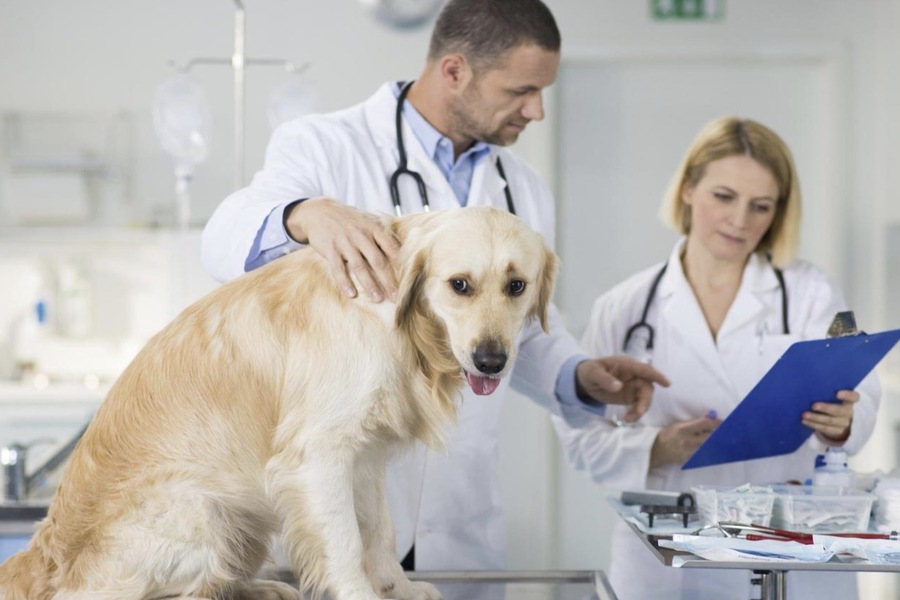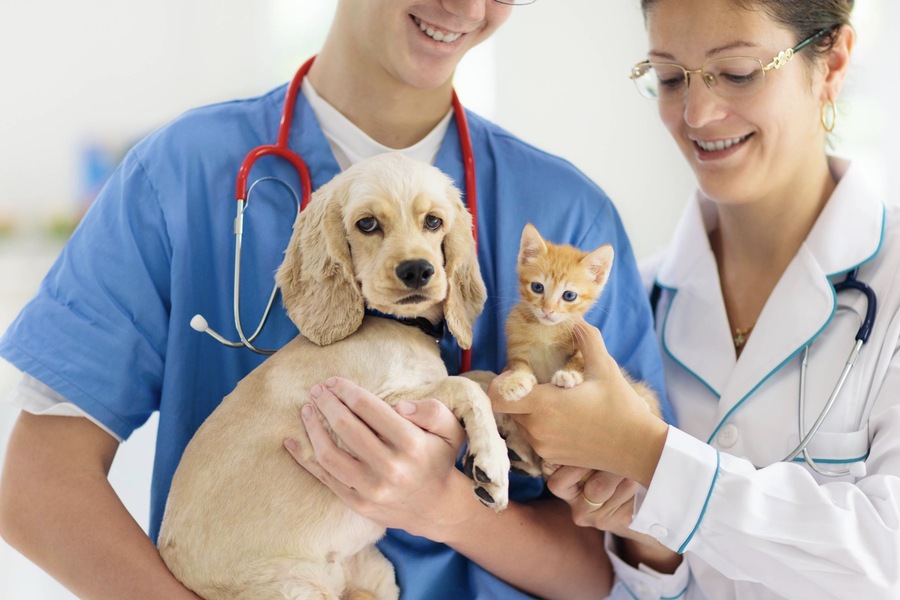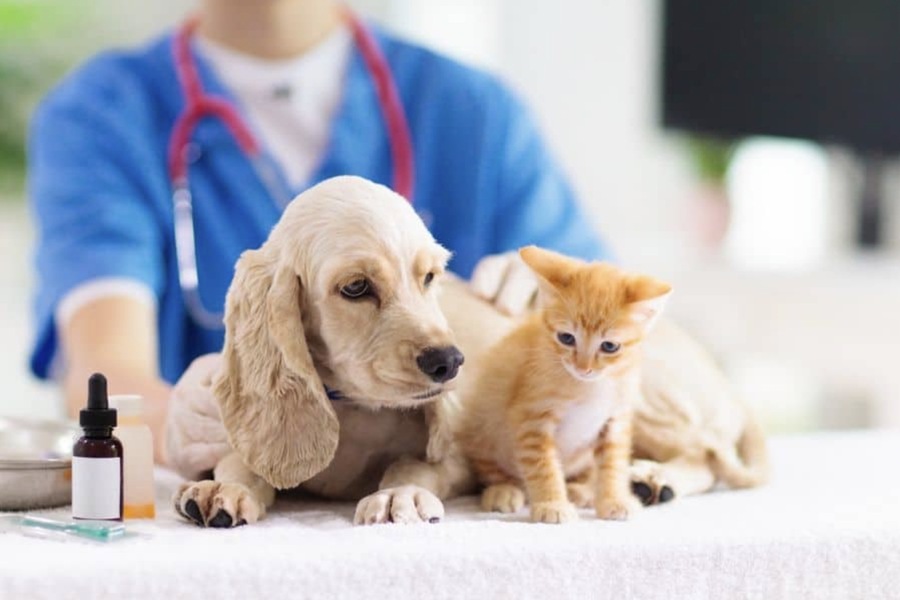Why Frequent Exams Are Important
Your pet’s long-term health should be your first concern as a pet owner. Regular veterinary exams at veterinary clinic are essential to give your pet the care it needs. Regular wellness checkups are extremely important, even though crises or clear health conditions prompt most veterinary appointments. Regular check-ups save money by avoiding needless medical procedures and help uncover possible health issues before they worsen, sparing your pet needless misery. Pets who receive regular veterinary treatment typically have longer, healthier lives, according to research done by the American Veterinary Medical Association (AVMA).
Prevention: Identifying Problems Early
For both humans and pets, routine examinations are essential to preventative care. As they age, pets can experience various health issues, many of which do not show signs until they get serious. This is also the case for humans. Frequent veterinary checkups can help diagnose diabetes, renal disease, and cancer, resulting in more reasonably priced and efficient therapies. Given that pets age more rapidly than humans, it is recommended to have annual or bi-annual check-ups to catch any health issues early on.
The veterinarian will evaluate your pet’s weight, coat condition, dental health, heart, and lungs during these examinations. Additionally, blood testing may reveal any underlying issues that a physical checkup might miss. Preventive care includes preventing heartworm, deworming, treating fleas and ticks, and controlling parasites. Caring for these problems as soon as they arise ensures your pet is healthy year-round.
Immunizations and Updating Your Pet’s Health
That your pet’s vaccination regimen is up to date is ensured by routine veterinary visits. For the health of your pet, immunizations are a must. Several diseases, many of which are fatal or result in major, long-term health issues, are protected against in animals by vaccinations. Core vaccinations for dogs usually cover distemper, parvovirus, and rabies, while cats are generally vaccinated against feline leukemia, calicivirus, and rabies. Depending on your pet’s lifestyle, non-core vaccinations could be advised. For example, kennel cough vaccination is recommended for dogs who regularly board at facilities.
Since they support immunity maintenance, booster shots are equally as vital as primary immunizations. You and your veterinarian will develop a vaccine program to guarantee your pet’s continued protection. Pets who receive their immunizations on time are considerably less likely to contract potentially fatal diseases, according to a report released by the American Veterinary Medical Association.

Dental Health Is Essential to General Wellness
Pet dental care is one area that is frequently disregarded. Poor dental hygiene can result in serious health issues, such as infections that could spread to other organs like the heart or kidneys. Your veterinarian will look for signs of periodontal disease during a routine examination. Over the age of three, periodontal disease affects 70% of cats and 80% of dogs. This sickness affects your pet’s teeth and gums. Gum discomfort, foul breath, and difficulty eating may be signs of more serious dental issues.
Expert teeth cleaning can help prevent these problems from worsening, and it usually doesn’t require anesthesia. Today, veterinarians frequently clean teeth thoroughly by removing plaque and tartar below the gum line using tools like ultrasonic scaling. Furthermore, routine exams allow your veterinarian to suggest at-home dental care practices, such as brushing your pet’s teeth or giving them dental chews to avoid plaque development.
The Role of Diet in Weight Management
Obesity is one of the health problems that affect dogs the most these days. In the US, 56% of dogs and over 60% of cats are overweight or obese, according to the Association for Pet Obesity Prevention. Frequent veterinary appointments are ideal for discussing weight management and diet. Obesity can bring on numerous health concerns, such as diabetes, joint problems, and heart disease.
During the examination, the veterinarian evaluates a pet’s body condition score (BCS) to ascertain whether the animal is underweight, overweight, or at a healthy weight. After that, you can collaborate to create a diet and exercise schedule customized to your pet’s requirements. Monitoring pets’ weight through regular check-ups helps prevent obesity and its associated complications, ensuring a healthier, more active life for your furry companion.
Monitoring Age-Related Health Concerns
Animals are more vulnerable as they get older to age-related illnesses such as organ failure, arthritis, and cognitive decline. Senior pets need routine examinations since early diagnosis of certain diseases can significantly improve their quality of life. Veterinarians may support imaging studies like X-rays or ultrasounds, blood tests, or urinalysis to monitor the health of critical organs, including the liver, kidneys, and heart.
Geriatric care frequently encompasses tailored guidance on diet, exercise, and supplements that can effectively manage age-related symptoms. For instance, omega-3 fatty acids or glucosamine supplements may be recommended to alleviate joint pain in arthritic pets. Regular wellness examinations allow veterinarians to adapt to treatment plans, ensuring older pets’ ongoing comfort and health.

The Growing Trend of Personalized Veterinary Care
Veterinary medicine is evolving, and personalized care is becoming a trend in pet healthcare. Many clinics offer Wellness plans, allowing pet owners to pay for services like annual check-ups, vaccinations, and dental cleanings through a subscription model, making routine care more accessible. Additionally, advancements in veterinary technology, such as telemedicine and mobile vet services, provide more flexible care options for pet owners.
Tele-veterinary consultations have seen a rise in popularity, especially during the pandemic. They offer a convenient way to address minor health concerns or follow-ups without leaving home. This trend allows regular monitoring of pet’s health without frequent in-person visits.
Concluding Remarks: An Everlasting Promise to Your Pet’s Health
Keeping your pet happy and healthy requires routine veterinary examinations. You can give your pet the finest care by detecting health issues early, ensuring current vaccines, and attending to age-related concerns. Being proactive about your pet’s health might result in a longer, more contented life together. Investing in these yearly examinations is one of your most significant duties as a pet owner, guaranteeing that your companion will be at your side for many years.
